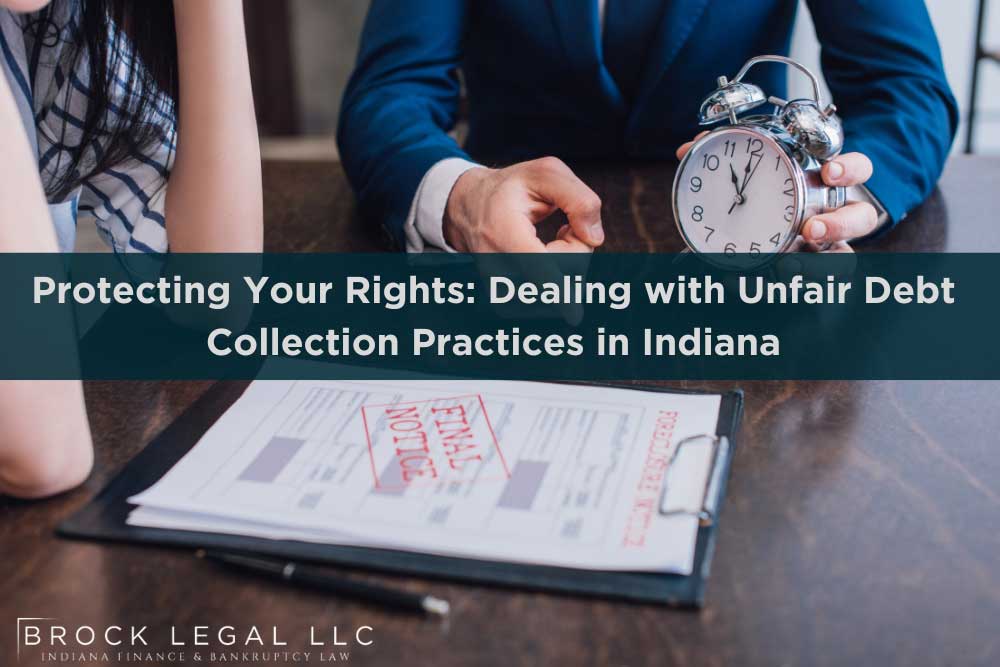Protecting Your Rights: Dealing with Unfair Debt Collection Practices in Indiana
by Attorney S. Zachary T. Brock

Table of Contents
Indiana Unfair Debt Collection: What Consumers in Indianapolis Need to Know
Dealing with collection calls is stressful enough without unfair tactics. If you live in Indianapolis, Carmel, Fishers, Greenwood, Lawrence, Avon, Plainfield, or any nearby city, you have clear rights under federal and Indiana law. When collectors cross the line, you can stop the behavior, correct errors, and seek relief. This guide explains what is legal, what is not, and how to respond in a way that protects your credit and your peace of mind.
Brock Legal helps people across central Indiana push back against harassment and resolve stubborn debts. We give you plain talk, a steady plan, and representation that keeps the pressure off your shoulders. The goal is simple. You should know your options and feel in control of what comes next.
Indiana Debt Collection Laws and FDCPA: Key Rules Consumers Should Understand
Knowing the rules helps you make fast, smart decisions when a collector calls. Here are the highlights that apply in Indianapolis and statewide Indiana.
- Federal Fair Debt Collection Practices Act (FDCPA). This law bans harassment, misrepresentation, unfair fees, and repeated calls meant to annoy. It restricts calls at inconvenient times and limits who collectors can contact about your debt. It also gives you the right to request verification in writing.
- Indiana consumer protection laws. Indiana enforces its own rules against abusive or deceptive practices by collection agencies and creditors. These laws work alongside the FDCPA and provide additional remedies in certain cases.
- Time limits and records. A collector cannot sue forever. Lawsuits must be filed within a time limit that depends on the type of account. The older the debt, the more likely you have defenses. Keep copies of all notices, payment records, and letters so your lawyer can evaluate timing issues.
- Communication preferences. You may tell a collector to stop calling at work or to communicate only in writing. Once you notify them in writing, they must honor that request except for limited legal notices.
- Attorney representation. When you hire a lawyer, collectors must speak with your attorney instead of you. This alone can reduce stress and prevent accidental statements that harm your case.
Original creditor versus debt buyer in Indiana
Some calls come from the original lender. Others come from a company that bought a batch of older accounts. Debt buyers often have limited documents and rely on data spreadsheets. That does not make the claim invalid, but it means you should ask for proof before you pay. A proper validation response should show your name, the full account history, and how the balance was calculated. If the collector cannot produce basic records, that weakness can shape your strategy.

Unfair Debt Collection Practices in Indiana: What Harassment Looks Like
Most collectors follow the law, but some do not. Watch for these warning signs in Indianapolis and nearby communities.
- Calls at odd hours or persistent robocalls. Repeated calls meant to annoy, calls very early or late, or calls to your job after you asked them to stop can violate consumer law.
- Lies and pressure. False threats of arrest, jail, or criminal charges are illegal. So are claims that a lawsuit has been filed when it has not, or that papers are on the way when there is no case.
- Sharing your debt with others. Collectors cannot discuss your debt with family, friends, or co workers except to locate you. Leaving detailed voicemail that others can hear is a red flag.
- Adding junk fees. A collector cannot add charges or interest not authorized by the contract or state law.
- Impersonation and fake badges. Anyone pretending to be a government officer, a lawyer, or a court official to scare you is breaking the law.
- Contact after written notice. If you send a letter telling a collector to stop contacting you, they must stop except for limited legal reasons. Continued contact can support a claim for damages.
Responding to Debt Collector Harassment in Indianapolis: Document, Dispute, and Protect Yourself
Strong records make strong cases. Start with a simple plan that you can follow even on a busy day. Create a folder for every debt and add notes after each call. Keep copies of letters and any envelopes that show mail dates. Save voicemail and screenshots of texts that feel abusive. Good documentation helps your lawyer prove what happened.
Build a clean paper trail in Indianapolis
When a collector first contacts you about a debt, ask for the company name, address, and account details. Do not admit the debt or agree to pay until you see it in writing. Many collection files change hands, and details get lost along the way. If the file is not accurate, you should not be pushed into a fast payment you cannot afford. Take a breath, gather documents, and build a clean timeline before you decide what to do next.
When a lawsuit is filed in Marion County or nearby courts
If a lawsuit is filed against you in Marion County or any nearby county, do not ignore it. Court papers have deadlines. An easy case for a collector becomes harder when you answer on time. With the right defenses and records, you can often negotiate a better result or get a weak claim dismissed. A missed deadline can lead to a default judgment, wage garnishment, and bank levy. A short call with a lawyer now can save months of trouble later.

Debt Validation in Indiana: How to Request Proof and Fix Errors
The first written notice from a collector triggers important rights. Use them to your advantage with a clear, simple process.
- Send a validation letter within 30 days. Request the amount owed, the name of the original creditor, and copies of documents that show you are the right person. Ask for the chain of ownership if the debt was sold. Send the letter by certified mail and keep the receipt.
- Dispute what is wrong. If the amount is off, the account is not yours, or the debt looks too old to sue on, say so in writing. Ask the collector to correct their records and to stop reporting inaccurate information to the credit bureaus.
- Pause calls until proof arrives. After you dispute in writing, the collector must stop collection until they mail verification. If calls continue without proof, log them and save the phone records.
- Check your credit reports. Pull all three reports to see if the collector is reporting the debt. If the entry is wrong or missing key details, file a dispute with each bureau and attach your documents.
- When a summons arrives. Validation is separate from a court case. If you have already been sued, you still need to file an answer by the deadline. Bring your validation letter and responses to your attorney so the court sees the full picture.
Indiana Debt Collection Defense: Settlement, Bankruptcy, and Credit Repair Options
No two files are alike. The best plan depends on your income, your goals, and how strong the claim is. Brock Legal focuses on practical results for families in Indianapolis and the surrounding cities.
If the claim is small or the paperwork is weak, negotiation may resolve the matter with a fair settlement and a written release. If there are many accounts and constant lawsuits, a bankruptcy case can stop collection and give you room to rebuild. We file clean schedules, protect exempt assets, and move quickly to stop wage garnishment. After a case, we help you correct credit reporting so your fresh start shows up where it matters.
When to speak with a lawyer in Indianapolis
Some clients do not need to file at all. If the debt is beyond the time limit to sue, or if the collector cannot prove ownership, we build a defense and push for dismissal. If your only issue is credit report accuracy, we focus on disputes and correction letters. If you are dealing with threats at work, calls to family, or sudden bank levies, talk to a lawyer right away. The right tool is the one that meets your goals with the least cost and stress.
FAQs: Credit Score After Bankruptcy in Indiana
Yes, but if you tell them your employer does not allow these calls, they must stop. Put your request in writing and keep a copy. If they continue to call your workplace, save the call logs and speak with a lawyer about next steps.
Calls late at night or very early in the morning are often considered inconvenient. If a time is bad for you, say so in writing. You can also ask for all communication in writing. If calls keep coming at bad times, document them and consider legal action.
No. A collector may contact other people only to locate you, and even then they cannot say you owe a debt. If someone shares details about your account with a third party, that is a warning sign of an illegal practice.
Do not ignore the summons. File an answer by the deadline and gather your records. A lawyer can evaluate defenses, negotiate with the collector, and protect you from default judgments and wage garnishment.
Yes. Filing a case creates an automatic stay that stops most collection activities, including calls, letters, lawsuits, garnishments, and levies. If a collector violates the stay, the court can order penalties. Your attorney will explain how this works in Chapter 7 and Chapter 13.

Contact Brock Legal, LLC: Stop Unfair Debt Collection in Indianapolis Today
If collection pressure is taking over your day, start with a conversation. Brock Legal has helped many people in Indianapolis, Carmel, Fishers, Greenwood, Lawrence, and nearby cities stop harassment and move forward. We listen first, explain your rights in plain language, and build a plan that fits your budget and your goals.
Call 317.505.0336 or email zach@indyfinancelaw.com to schedule a free consultation. Whether your best option is a dispute letter, a defense in court, a fair settlement, or a bankruptcy filing, we will help you understand the choices and take confident action. You deserve clear answers and a path that protects your rights.
Attorney S. Zachary T. Brock

Attorney S. Zachary T. Brock
Zach empowers individuals faced with financial challenges by providing them with effective solutions and unwavering support in the areas of consumer finance and bankruptcy law.
By actively listening and empathizing with each client, Zach works to gain a deep understanding of every individual or family’s unique circumstances. This helps him tailor his legal strategy to best meet the needs of each client.
“No matter what may be weighing you down financially, Brock Legal is here to help. My mission is to help navigate you through whatever stressful circumstance you may be faced with, by offering unparalleled education and service in the areas of consumer finance and bankruptcy law. Let us show you how our firm can help. Contact Brock Legal today!”
-Zach



